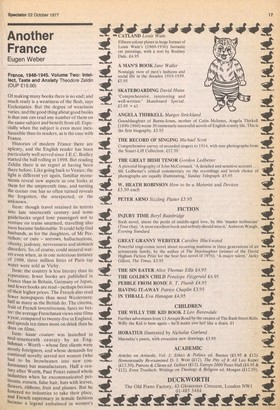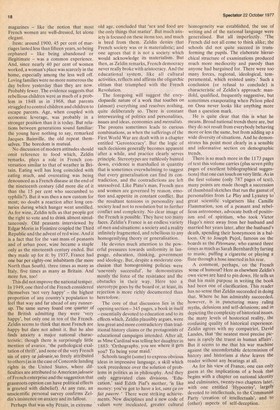Another France
Eugen Weber
France, 1948-1945. Volume Two: Intellect, Taste and Anxiety Theodore Zeldin (OUP E15.00) Of making many books there is no end; and much study is a weariness of the flesh, says Ecclesiastes. But the degree of weariness varies, and the good thing about good books is that one can read any number of them on the same subject and benefit from all. Especially when the subject is even more inexhaustible than its readers, as is the case with France.
Histories of modern France there are aplenty, and the English reader has been particularly well served since J.E.C. Bodley started the ball rolling in 1898. But reading Zeldin there is no regret at having been there before. Like going back to Venice, the light is different yet again, familiar monuments reveal new aspects as one looks at them for the umpteenth time, and turning the corner one has so often turned reveals the forgotten, the unexpected, or the unknown.
Item: though travel retained its terrors into late nineteenth century and some guidebooks urged lone passengers not to venture on trains unarmed, travelling also soon became fashionable. It could help find husbands, as for the daughters, of Mr Perrichon; or cure — sorrows, hallucinations, Obesity, jealousy, nervousness and stomach disorders. So, of course, could mineral waters even when, as in one notorious instance of 1908, three million litres of Paris tap water were sold as Vichy. Item: the country is less literary than its reputation; fewer books are published in France than in Britain, Germany or Japan, and fewer books are read — perhaps because of their higher prices. The French also read fewer newspapers than most Westerners: half as many as the British do. The cinema, fruit of French inventiveness, fares no better: the average Frenchman views nine films a year, compared to twenty-five in England, and spends ten times more on drink than he does on films.
Item: haute couture was launched in mid-nineteenth century by an Englishman — Worth — whose first clients were mostly foreigners, and whose demands for continual novelty served not women (who had to be browbeaten into new conformisms) but manufacturers. Half a century after Worth, Paul Poiret ruined whole industries when he excommunicated petticoats, corsets, false hair, hats with leaves, flowers, ribbons, fruit and plumes. But he fostered no industries to take their place, and French supremacy in female fashions became a legend embalmed in women's magazines — like the notion that most French women are well-dressed, let alone elegant.
Item: around 1900, 45 per cent of marriages lasted less than fifteen years, so being orphaned — like being abandoned or illegitimate — was a common experience. And, since nearly 40 per cent of women worked, a woman's place was scarcely in the home, especially among the less well off. Loving families were no more numerous the day before yesterday than they are now. Probably fewer. The evidence suggests that rebellious children were as much of a problem in 1848 as in 1968, that parents struggled to control children and children to escape parents. Age, when coupled with economic leverage, was probably in a stronger position than it is today. But relations between generations sound familiar: the young have nothing to say, remarked Jacques Bainville, the old repeat themselves. The boredom is mutual.
No discussion of modern attitudes should omit reference to food which, Zeldin remarks, plays a role in French conversation similar to that of weather in Britain. Eating well has long coincided with eating much, and overeating was being denounced as a French disease at the end of the nineteenth century (did more die of it than the 15 per cent who succumbed to syphilis?). But it was then a new custom for most; no doubt a reaction after long centuries during which hunger went unstilled. As for wine, Zeldin tells us that people got the right to vote and to drink almost simultaneously. Old peasants interviewed by Edgar Morin in Finistere coupled the Third Republic and the advent of red wine. And it is a fact that for the vast mass of peasants and of urban poor, wine became a staple only as the nineteenth century ended. But they made up for it: by 1937, France had one bar per eighty-one inhabitants (far more North than South), three times as many as Italy, five times as many as Britain. And more fun, too!
This did not improve the national temper., In 1949, one third of the French considered themselves not very happy' — the highest proportion of any country's population to feel that way and far ahead of any runnerup. The same survey found one quarter of the British admitting they were 'very happy', but only one in ten of the French. Zeldin seems to think that most French are happy but dare not admit it. But he also finds anxiety a major national characteristic; though there is surprisingly little mention of avarice, 'the pathological exaltation of thrift', and none of the very French sin of envy or falorzie,so freely attributed to others (as in the case of Concorde landing rights in the United States, where difficulties are attributed to American jai° usie of French enterprise and the suggestion that grassroots opinion can have political effects is greeted with disbelief). At any rate, an unscientific personal survey confirms Zeldin's insistence on anxiety and its fallout.
Perhaps that was why Main, in extreme • old age, concluded that 'sex and food are the only things that matter'. But much anxiety is focused on these items too, and much is bred from them. Zeldin denies that French society was or is materialistic; and one agrees that it is not a society which would acknowledge its materialism. But then, as Zeldin remarks, French democracy never really broke with aristocracy. And the educational system, like all cultural activities, reflects and affirms the oligarchic elitism that triumphed with the French Revolution.
The foregoing will suggest the encyclopaedic nature of a work that touches on (almost) everything and resolves nothing, quite deliberately so. There is constant interweaving of politics and personalities, issues and ideas, economics and mentalites. The process sometimes leads to curious combinations, as when the sufferings of the First World War are dealt with in a chapter entitled `Gerontocracy'. But the logic of such decisions generally becomes apparent ' after a while, and practice clearly serves principle. Stereotypes are ruthlessly hunted down, evidence is marshalled in quantity that is sometimes overwhelming to suggest that every generalisation can find its contradiction, and the contradictions are left unresolved. Like Plato's man, French men and women are governed by reason, emotion and.appetite in constant conflict. But the resultant tensions in personality and society lead not to resolution but to further conflict and complexity. No clear image of the French is possible. They have too many faces. Zeldin's France is an endless variety of men and situations: a society and a reality infinitely fragmented, and rebellious to any homogenifying theory or generalisation, He devotes much attention to the powerful pressures towards uniformity in language, education, thinking, government and ideology. But, despite a moderate conclusion that homogenising policies were 'unevenly successful', he demonstrates mostly the force of the resistance and the obstacles in their way. Here too a stereotype goes by the board or, at least, its rejection is more richly documented than heretofore.
The core of that discussion lies in the opening section —345 pages, a book in itself — essentially devoted to education and to its effects which, Zeldin plausibly argues, were less great and more contradictory than traditional history claims or the protagonists of educational campaigns intended. After all, as Mme Cardinal was telling her daughter in 1883: 'Orthography, you see where it gets you? To being your maid.'
Schools taught (some) to express obvious ideas in impressive language, a skill which took precedence over the solution of problems in politics as in philosophy. And they only aggravated class divisions. 'Education,' said Edith Piars mother, 'is like money: you've got to have a lot, sans fa on fait pauvre.' There were striking achievements. New disciplines and a new code of values were inculcated, greater cultural homogeneity was established, the use of writing and of the national language were generalised. But all imperfectly. 'The French did not all come to think alike; the schools did not quite succeed in transforming the pupils. The elaborate hierarchical structure of examinations produced much more mediocrity and parody than anyone had bargained for. There were too many forces, regional, ideological, temperamental, which resisted unity.' Such a conclusion (or refusal to conclude) is characteristic of Zeldin's approach: manifold, qualified, frequently suggestive, but sometimes exasperating when Pelion piled on Ossa never looks like anything more than a question mark.
He is quite clear that this is what he means. Broad national trends there are, but they do not result from everybody behaving more or less the same, but from adding up a wide diversity of situations. And he demonstrates his point most clearly in a sensible and informative section on demographic trends.
There is so much more in the 1173 pages of text this volume carries (plus seven pithy pages of excellent bibliographical suggestions) that one can touch on very little. As in the first volume (only 787 pages of text), many points are made though a succession of thumbnail sketches that run the gamut of personalities from Le Play and Lyautey to great scientifie vulgarisers like Camille Flammarion, son of a peasant and rebellious astronomer, advocate both of positivism and of spiritism, who took Victor Hugo's niece away from her husband and married her years later, after the husband's death, spending their honeymoon in a balloon. Or to Joseph Pujol, famous on the boards as the Petomane, who earned three times as much as Sarah Bernhardt by farting to music, puffing a cigarette or playing a flute through a hose inserted in his rear.
A comment, perhaps, on the French sense of humour? Here as elsewhere Zeldin's own views are hard to pin down. He tells us that his main purpose in writing the book had been one of clarification. This reader has no sense that Zeldin succeeded in doing that. Where he has admirably succeeded, however, is in puncturing many ruling myths, delusions and self-delusions; and in depicting the complexity of historical issues, the many levels of hostorical reality, the confusing quality of historical experience. Zeldin agrees with my compatriot, David Landes, that 'the neatest most precise picture is rarely the truest in human affairs', But it seems to me that his war machine against the uncomfortable determinism of history and historians a these leaves the reader without any bearings at all.
As for his view of France, one can only guess at the implications of a book that begins with a chapter on national identity and culminates, twenty-two chapters later, with one entitled 'Hypocrisy', largely devoted to intellectuals, to the Communist Party 'creation of intellectuals', and to (other) aspects of self-deception.



































 Previous page
Previous page